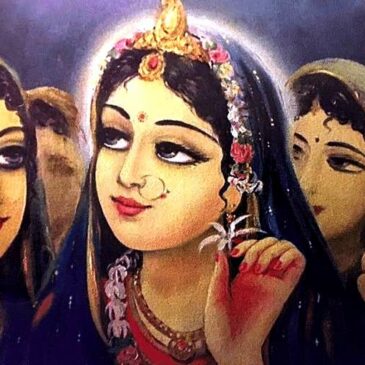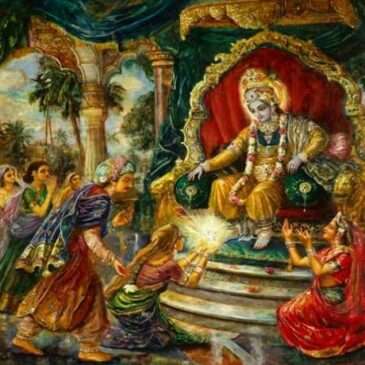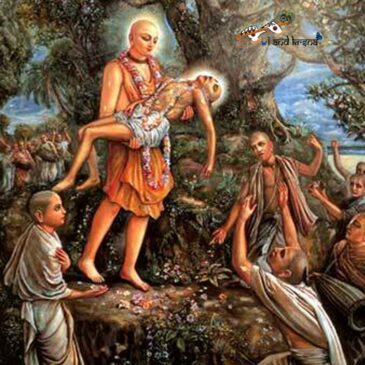Aclaración de lo que es el Dharma en relación con el Bhakti
Preguntas Haré Krishna su gracia Manonatha Maharaj, acepte mis humildes reverencias, todas las glorias a Shrila Prabhupada y al sadhusanga. Con relación al Dharma Maharaj, una pregunta: Bg. 4.7 yadā yadā hi dharmasya glānir bhavati bhārata … Read More
Srimad-Bhagavatam 1.12.9
ŚB 1.12.9 श्रीमद्दीर्घचतुर्बाहुं तप्तकाञ्चनकुण्डलम् । क्षतजाक्षं गदापाणिमात्मन: सर्वतोदिशम् । परिभ्रमन्तमुल्काभां भ्रामयन्तं गदां मुहु: ॥ ९ ॥ śrīmad-dīrgha-catur-bāhuṁ tapta-kāñcana-kuṇḍalam kṣatajākṣaṁ gadā-pāṇim ātmanaḥ sarvato diśam paribhramantam ulkābhāṁ bhrāmayantaṁ gadāṁ muhuḥ Synonyms śrīmat — enriched; dīrgha — prolonged; catuḥ–bāhum … Read More
Second Month of Caturmasya Begins
“The Caturmasya period begins in the month of Ashadha (June-July) from the day of Ekadasi called Sayana-ekadasi, in the fortnight of the waxing moon. The period ends in the month of Kartika (October-November) on the Ekadasi … Read More
Is women sannyasa authorized?
PRAMANA (evidence) of women-sannyasa in SAMSKAR DEEPIKA by Srila Gopal Bhatta Goswamipada with Translation & Purport by Srila Saccidananda Bhaktivinoda Thakura: “garhasthya-kritya-sampraptau naramatra-adhikarita |brahmacharyadi-kritye tu trai-vanikam-apekshate || 1 || Translation: Everyone has the right to enter … Read More
Like the sun Chariot moving across the sky? Is this to be taken literally?
Like the sun Chariot moving across the sky? Is this to be taken literally? By the late Sadaputa Dasa ACBSP Can a rational person accept the stories of the Puranas as literally true? Presented at the … Read More
Second Month of Caturmasya Begins
Second Month of Caturmasya Begins « Back to Events This event has passed. Event: Second Month of Caturmasya Begins Date: August 22, 2013 (Mayapur) Category: Other Festivals Second Month of Caturmas BeginsSecond month: No yoghurt (if … Read More
Srimad-Bhagavatam 1.12.11
ŚB 1.12.11 विधूय तदमेयात्मा भगवान्धर्मगुब् विभु: । मिषतो दशमासस्य तत्रैवान्तर्दधे हरि: ॥ ११ ॥ vidhūya tad ameyātmā bhagavān dharma-gub vibhuḥ miṣato daśamāsasya tatraivāntardadhe hariḥ Synonyms vidhūya — having completely washed off; tat — that; ameyātmā — … Read More
Brahma Samhita 1 (in italiano)
īśvaraḥ paramaḥ kṛṣṇaḥ sac-cid-ānanda-vigrahaḥ anādir ādir govindaḥ sarva-kāraṇa-kāraṇam Sinonimi īśvarah: il controllore; paramah: supremo; kṛṣṇaḥ: Signore Krishnaa; sat: che comprende l’esistenza eterna; cit: conoscenza assoluta; ānanda: e assoluta beatitudine; vigrahah: la cui forma; anādih: senza … Read More
Caturmasya y los fantasmas de lo que eran
Pregunta Hare Krishna GuruMaharaja. Por favor acepte mis humildes reverencias. Todas las glorias a SrilaPrabhupada!! Le quiero preguntar que Srila Prabhupada instruyo o ordeno sobre los meses de Charturmasya, ya que comienza el primero ahora sobre … Read More
Ganga Puja
26 2015 This is literally the “birthday or descent of mother Ganges – Ganga Ma”. Throughout india this festival lasts ten days beginning on the Amavasya (dark moon night) and going through to the dasami tithi … Read More
Srimad-Bhagavatam 2.6.38
ŚB 2.6.38 यस्यावतारकर्माणि गायन्ति ह्यस्मदादय: । न यं विदन्ति तत्त्वेन तस्मै भगवते नम: ॥ ३८ ॥ yasyāvatāra-karmāṇi gāyanti hy asmad-ādayaḥ na yaṁ vidanti tattvena tasmai bhagavate namaḥ Synonyms yasya — whose; avatāra — incarnation; karmāṇi — … Read More
Caturmasya
21 2016 Second month: No yoghurt (if one requires it for health, it can be mixed with water) Caturmasya stands for ‘four months’. It is the period between sayana and uttana ekadasis. The scriptures refer to … Read More







